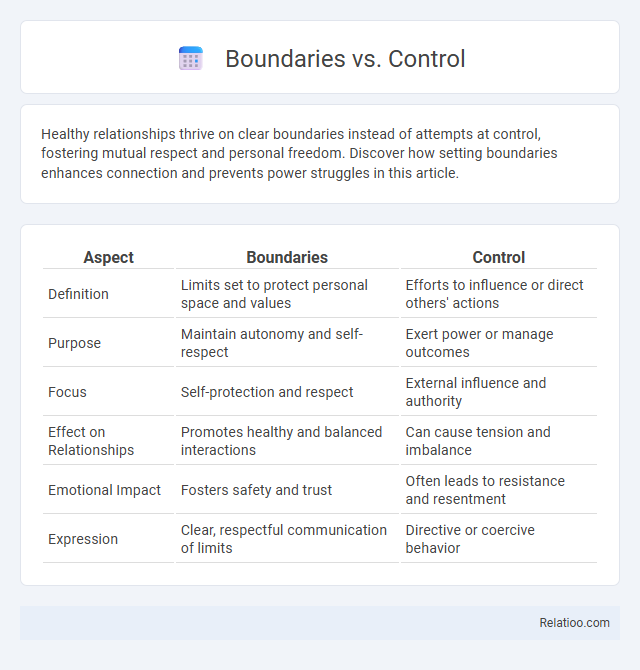Healthy relationships thrive on clear boundaries instead of attempts at control, fostering mutual respect and personal freedom. Discover how setting boundaries enhances connection and prevents power struggles in this article.
Table of Comparison
| Aspect | Boundaries | Control |
|---|---|---|
| Definition | Limits set to protect personal space and values | Efforts to influence or direct others' actions |
| Purpose | Maintain autonomy and self-respect | Exert power or manage outcomes |
| Focus | Self-protection and respect | External influence and authority |
| Effect on Relationships | Promotes healthy and balanced interactions | Can cause tension and imbalance |
| Emotional Impact | Fosters safety and trust | Often leads to resistance and resentment |
| Expression | Clear, respectful communication of limits | Directive or coercive behavior |
Understanding Boundaries vs Control
Understanding boundaries involves recognizing and respecting personal limits to maintain healthy relationships without overstepping individual autonomy. Control often manifests as an attempt to dominate or dictate others' behaviors, contrasting boundaries that protect personal space and emotional well-being. Establishing clear boundaries fosters mutual respect, while control tends to undermine trust and personal freedom.
Defining Healthy Boundaries
Healthy boundaries are essential for maintaining balance between personal needs and relationships by clearly defining limits on acceptable behavior and interactions. Establishing these boundaries involves recognizing one's values, communicating them assertively, and respecting others' limits to prevent emotional exhaustion and maintain mutual respect. Effective boundary-setting supports self-care by empowering individuals to control their time, energy, and well-being without guilt.
Signs of Controlling Behavior
Controlling behavior often manifests through signs such as constant monitoring, excessive criticism, and limiting your interactions with others, which can sabotage your autonomy and emotional well-being. Recognizing these signs is crucial for establishing healthy boundaries that protect your space without resorting to controlling tactics yourself. Prioritizing self-care involves maintaining your independence and emotional health by setting clear limits against manipulation and control.
The Importance of Setting Boundaries
Setting boundaries is essential for maintaining your mental health and emotional well-being, as it clearly defines what behavior you will accept from others. Boundaries help prevent burnout by allowing you to prioritize self-care and protect your time and energy from being overwhelmed by external demands. Understanding the difference between boundaries and control empowers you to foster healthy relationships while ensuring your needs are respected.
Emotional Impact of Control
Excessive control in relationships often creates emotional distress, leading to anxiety, diminished self-esteem, and feelings of helplessness. Establishing clear boundaries promotes autonomy and reduces the harmful impact of control by fostering respect and emotional safety. Consistent self-care practices strengthen resilience, helping individuals recognize and resist controlling behaviors while maintaining emotional well-being.
Boundaries in Relationships
Boundaries in relationships define the limits that protect your emotional well-being and personal space, preventing others from overstepping or manipulating you. Clear boundaries ensure mutual respect and trust, enabling healthy communication and preventing the need for excessive control or burnout. Prioritizing boundaries empowers you to maintain self-care while fostering balanced, respectful connections.
Strategies for Asserting Boundaries
Effective strategies for asserting boundaries involve clear communication of your limits and consistent reinforcement to prevent overstepping. Establishing firm, respectful boundaries empowers you to maintain control over your personal space and emotional well-being. Prioritizing self-care by recognizing your needs ensures that boundary-setting supports a balanced and healthy lifestyle.
Overcoming the Need to Control
Overcoming the need to control involves recognizing the difference between setting healthy boundaries and exerting control over others, which often stems from insecurity or fear. Your self-care routine improves when you respect others' autonomy while clearly defining your limits, fostering mutual trust and emotional well-being. Embracing acceptance rather than control empowers you to focus on what you can change within yourself, enhancing resilience and reducing stress.
Benefits of Respectful Boundaries
Respectful boundaries enhance personal well-being by fostering mutual respect and clear communication, reducing stress and misunderstandings in relationships. Establishing these limits promotes emotional safety and empowers individuals to maintain autonomy without imposing control over others. Prioritizing respectful boundaries supports healthier interactions and encourages self-care by allowing space for individual needs and growth.
Cultivating Mutual Respect
Cultivating mutual respect involves establishing clear boundaries that honor your needs while recognizing others' limits without exerting control. Effective self-care means prioritizing your well-being by communicating your boundaries assertively but empathetically. This balance fosters trust and cooperation, enhancing relationships through respect rather than dominance.

Infographic: Boundaries vs Control
 relatioo.com
relatioo.com